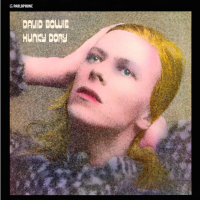Not So "Hunky Dory"?
Bowie announced the outlook flip on the chipper opener "Changes" and then doubled down on the even more so "Oh! You Pretty Things/Eight Line Poem" in which he describes a comfortable domestic scene while at the same time announcing a generational, even perhaps an evolutionary change— one that he makes clear he was ready to lead.
He continues addressing a dissatisfied generation looking for escape in "Life on Mars" and then goes 100% domestic on "Kooks". He ends the side in the "Quicksand" of his previous albums' darker imagery, referencing the occultist, painter and poet Aliester Crowley in whose "uniform" he says he's immersed, as well as the S.S. monster Himmler. He describes himself as "living proof of Churchill's lies" and then, showing not a hint of modesty exclaims a FriedrichNietzsche-ian belief that "he's not a prophet or a stone age man, Just a mortal with potential of a Superman". Bowie delivers in song the reading in which he's obviously immersed himself.
"Quicksand" is a song made for the end of a record side. Without a side-flip the album would chug right into Biff Rose's purifying "Fill Your Heart". What's a refreshment as an album side starter, would sound abrupt and perhaps even ridiculous with but a few second break in between.
Bowie's "what happened to you, Bob?" "Song For Bob Dylan" is one I bet now he'd prefer he could take back, but at the time it made sense to yearning fans, which is how it was intended. No doubt many fans of early Bowie felt the same way about the "Let's Dance" stadium Bowie. Then comes Bowie's swishy "Queen Bitch"—a high energy Velvet Underground tribute that sets up the magnificent, mysterious, still chilling "The Bewlay Brothers".
Hunky Dory swings wildly between Bowie's otherworldly preoccupations and scenes of domestic tranquility that serve to humanize and ground—if just for a short time—an artist searching for his next move. Of the albums in this box set, Hunky Dory is the most grounded and listener-relatable, though with lines like "A crack in the sky and a hand reaching down to me" there's plenty of disturbing imagery that's lost none of its potency all these years later.
When you've been listening to an album for more than forty years, you have certain sonic and visceral recollections and expectations. Sitting down to listen first to this box set reissue, I had to temper expectations somewhat because I'm reviewing new speakers and new amplifiers.
When "Changes" began, the sound was different in ways that made me confident I was hearing a remastering that was more a 're-imagining" than an effort to reproduce the sound found on the original, on the EMI 100 reissue cut from analog tape, on the '80s era Japanese pressing (RVP-6126) and even, believe it or not the Rykodisc digitally remastered double LP (the second disc contains bonus tracks).
Of course I couldn't be sure until I listened to all of those on these new speakers and amplifiers. How was the sound different on this reissue? Bowie's voice sounded recessed. It didn't project. The snare drum snap on the opening track lacked the familiar crackle.
Though side one was different than expected and somewhat soft—you could even say a bit muffled and lacking in high frequency energy—it wasn't a fatal flaw until "Andy Warhol". The acoustic guitars on that track should be hard and jarring. They sound purposely congested, compressed and bright on every other version I have of this album, but on this reissue the guitars sound positively polite. That cannot be right. It is not right.
Please listen to the interview I conducted with Ken Scott who engineered this album and Ziggy Stardust as well Procol Harum's epic A Salty Dog and some of The Beatles.
Without reference to other pressings and if you are not familiar with this record—if other versions are not imprinted in your brain—this is a pleasant sounding record but it lacks the bite and transient sparkle found on the other versions. Perhaps it's purposeful because all of those were purposely brightened for commercial purposes and this reissue corrects a "wrong". I don't know, but the other problem with this reissue is that it sounds spatially somewhat flat, though inner detail resolution is outstanding.
Has this album been "digitally remastered"? I don't know and I don't want to speculate because that's not the issue. The issue is how does it sound and how does it make you (me) feel?
To me it sounds fine—as long as you don't compare it to the others. Do that and it sounds somewhat soft and constrained. "Andy Warhol" does not at all sound right. Perhaps Bowie or Ken Scott, or Ray Staff or all of them have decided to mellow it out. That's all I can think of because it certainly does not sound like any of the other issues of that song that I've got. On some systems—especially bright lean ones—it might sound tonally better than the others but spatially it will still sound kind of flat.
As far as I'm concerned, based on sound, the value and collectibility of the 1997 EMI100 reissue (724382144915) will only increase—especially when fans get to compare that one with this. I'm disappointed. The packaging and pressing are top quality. The other records in the set will be reviewed as soon as possible.



